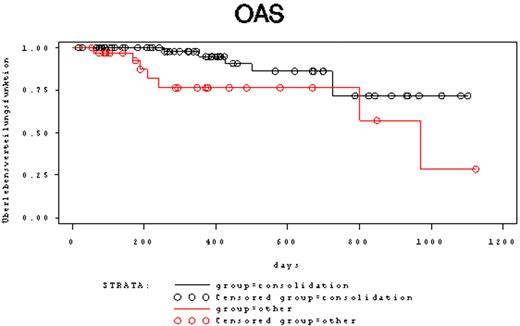Abstract
Abstract 3746
Poster Board III-682
Mantle cell lymphoma (MCL) is a rare subtype (3-9%) of Non Hodgkin Lymphoma (NHL) with a relatively poor prognosis (5-year survival < 40%). Although consolidation of first remission with autologous stem cell transplantation (ASCT) is regarded as “golden standard”, less than half of the patients may be subjected to this intensive treatment due to advanced age and co-morbidities. Standard-dose non-myeloablative radioimmunotherapy (RIT) seems to be a very efficient approach for treatment of certain NHL. However, there are almost no data available on the efficacy and safety of RIT in MCL.
In the RIT-Network, a web-based international registry collecting real observational data from RIT-treated patients, 115 MCL patients treated with ibritumomab tiuxetan were recorded. Most of the patients were elderly males with advanced stage of the disease: median age – 63 (range 31-78); males – 70.4%, stage III/IV – 92%. RIT (i.e. application of ibritumomab tiuxetan) was a part of the first line therapy in 48 pts. (43%). Further 38 pts. (33%) received ibritumomab tiuxetan after two previous chemotherapy regimens, and 33 pts. (24%) after completing 3-8 lines. In 75 cases RIT was applied as a consolidation of chemotherapy induced response; the rest of the patients received ibritumomab tiuxetan because of relapse/refractory disease. At the moment follow up data are available for 74 MCL patients.
After RIT the patients achieved high response rate: CR 60.8%, PR 25.7%, and SD 2.7%. Only 10.8% of the patients progressed. For survival analysis many data had to be censored since the documentation had not been completed yet. The projected 3-year overall survival (OAS, fig.1 – image 001.gif) after radioimmunotherapy was 72% for pts. subjected to RIT consolidation versus 29% for those treated in relapse/refractory disease (p=0.03). RIT was feasible for almost all patients; only 3 procedure-related deaths were reported in the whole group. The main adverse event was hematological toxicity (grade III/IV cytopenias) showing a median time of recovery of Hb, WBC and Plt of 45, 40 and 38 days respectively.
Standard-dose non-myeloablative RIT is a feasible and safe treatment modality, even for elderly MCL pts. Consolidation radioimmunotherapy with ibritumomab tiuxetan may prolong survival of patients who achieved clinical response after chemotherapy. Therefore, this consolidation approach should be considered as a treatment strategy for those, who are not eligible for ASCT. RIT also has a potential role as a palliation therapy in relapsing/resistant cases.
Off Label Use: Ibritumomab Tiuxetan (Zevalin) for MCL.
Author notes
Asterisk with author names denotes non-ASH members.


This feature is available to Subscribers Only
Sign In or Create an Account Close Modal